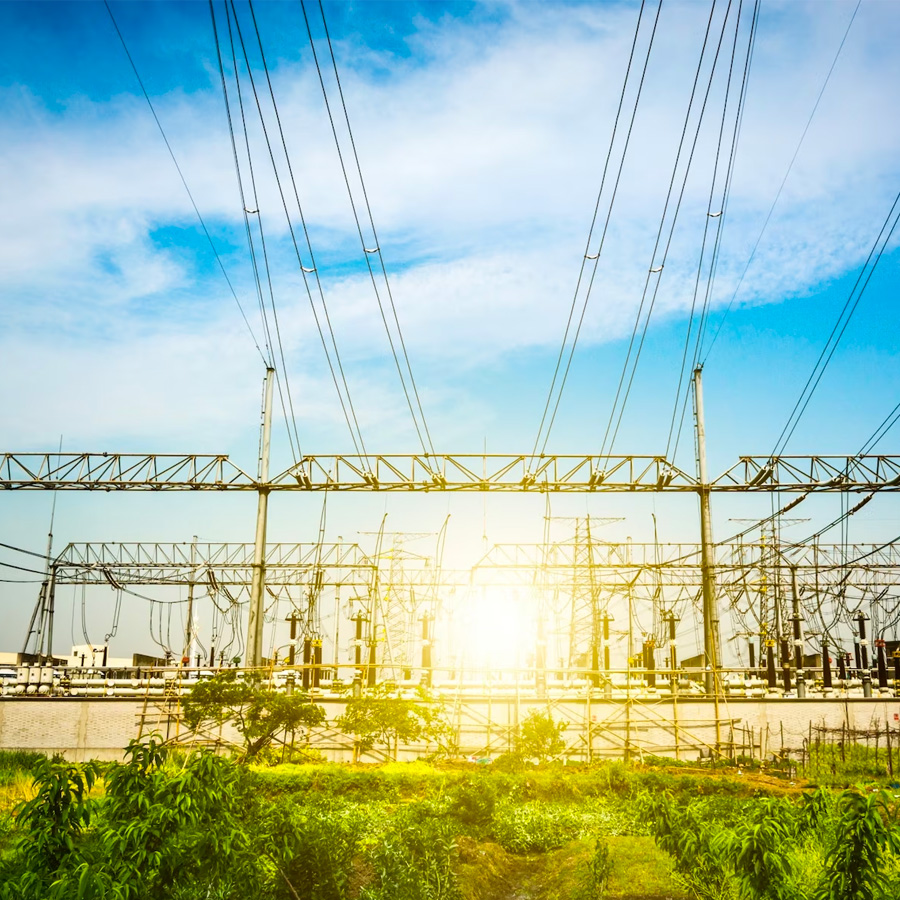Bachelor of Science in Electrical Engineering with concentration in Power and Energy Engineering
May 11, 2023 2024-02-27 7:16- College Of Engineering & IT
- undergraduate
Bachelor of Science in Electrical Engineering with concentration in Power and Energy Engineering
Fall & Spring
Intake
Full & Part time
Study Mode
135 hours
Total Credit Hours
4 Years
Duration
English
Language
Overview
Admission Requirement
| High School | English | Math | Other |
| 90% for General Stream or 80% for Advanced Stream or 75% for Elite Stream | EmSAT 1100 or Academic IELTS 5.00 or TOEFL (PBT 500 or IBT 61 or CBT 173) | EmSAT 900 or UD Math Placement Test | Physics EmSAT 800, or minimum high school Physics 80% Chemistry or Biology EmSAT 600, or minimum high school Chemistry or Biology 80% |
Who is the program for?
Career Opportunities
- Power Systems Engineer: Power systems engineers are responsible for designing, operating, and maintaining electrical power systems. They work on tasks such as power system analysis, grid integration of renewable energy sources, system protection, load forecasting, and optimizing power generation and distribution.
- Renewable Energy Engineer: With a focus on sustainable energy practices, graduates can work as renewable energy engineers. They design and implement renewable energy systems such as solar, wind, geothermal, and biomass. Their work involves assessing site feasibility, optimizing energy production, and ensuring efficient integration with the existing power grid.
- Energy Analyst: Energy analysts evaluate energy consumption patterns and identify ways to improve energy efficiency. They conduct energy audits, analyze data, and propose strategies to reduce energy waste and optimize energy usage in industrial, commercial, or residential settings.
- Power Plant Engineer: Power plant engineers are involved in the operation and maintenance of power generation facilities, such as thermal power plants, hydroelectric plants, or nuclear power plants. They monitor equipment performance, ensure compliance with safety regulations, and troubleshoot technical issues.
- Power Electronics Engineer: Power electronics engineers specialize in the design and development of electronic devices and systems for power conversion and control. They work on projects related to energy storage, electric vehicle charging systems, power converters, and smart grid technologies.
- Energy Consultant: Energy consultants provide expert advice to organizations or individuals on energy-related matters. They may assess energy needs, recommend energy-efficient solutions, analyze energy costs, and develop sustainability strategies.
- Research and Development (R&D) Engineer: Graduates can pursue research and development roles in both industry and academia. They contribute to advancing energy technologies, developing new power generation methods, improving energy storage systems, or conducting research on renewable energy integration.
- Project Manager: Project managers in the power and energy sector oversee the planning, coordination, and execution of energy-related projects. They manage timelines, budgets, and resources to ensure successful project completion.
Estimated salary range
- Entry-Level Positions: For fresh graduates with little to no experience, entry-level positions in the power and energy engineering field in the UAE may offer a salary range of approximately AED 5,000 to AED 10,000 per month (AED stands for United Arab Emirates Dirham).
- Mid-Level Positions: As professionals gain more experience and expertise, they can expect higher salaries. Mid-level positions in power and energy engineering in the UAE may offer a salary range of approximately AED 10,000 to AED 20,000 per month.
- Senior-Level Positions: With significant experience and managerial responsibilities, senior-level positions in power and energy engineering can command higher salaries. The salary range for senior professionals in the UAE may vary from AED 20,000 to AED 40,000 per month or more.
Study Plan
| Code | Course Title | Pre-Req | Accumulate Credits | Code | Course Title | Pre-Req | Accumulate Credits | ||
| Semester 1 | ENGL 110 | English 1 | 3 | Semester 2 | ENGL 120 | English 2 | ENGL 110 | 3 | |
| EMTH 100 | Calculus 1 | 3 | EMTH 150 | Calculus 2 | EMTH 100 | 3 | |||
| GPHY 100 | General Physics 1* | 3 | GPHY 150 | General Physics 2* | GPHY 100 | 3 | |||
| GECE 100 | Chemistry 1 | 3 | ENAP 150 | Computer Algorithms & Programing* | 3 | ||||
| ENIN 100 | Engineering Innovation | 3 | Humanities and Social Science Requirements (3CHs) | ENGL 110 | 3 | ||||
| GISL 100 | Islamic Thought | 3 | |||||||
| 15 | 15 | 33 | 18 |
| Code | Course Title | Pre-Req | Accumulate Credits | Code | Course Title | Pre-Req | Accumulate Credits | ||
| Semester 3 | EMTH 200 | Calculus 3 | EMTH 150 | 3 | Semester 4 | BMNG200 | Management & Organization Behavior | Co-Req. ENGL 120 | 3 |
| EMTH 250 | Advanced Math I | EMTH 150 | 3 | EMTH 260 | Advanced Math II | EMTH 250 | 3 | ||
| ENMA 200 | MATLAB | 1 | ENGL 220 | Communication Skills | ENGL 120 | 3 | |||
| ENDD 200 | Digital Logic Design* | 4 | ENEL 250 | Electronics I * | ENEC 200 | 4 | |||
| ENEC 200 | Electric Circuits I* | EMTH150, GPHY 150 | 4 | ENEC 250 | Electric Circuits 2 | ENEC 200 | 3 | ||
| GEST 100 | Emirati Study | 3 | |||||||
| 51 | 18 | 67 | 16 |
| Code | Course Title | Pre-Req | Accumulate Credits | Code | Course Title | Pre-Req | Accumulate Credits | ||
| Semester 5 | ENSS 300 | Signals & Systems* | EMTH 260 | 3 | Semester 6 | ENEE 300 | Engineering Economics | EMTH 100 | 3 |
| ENPR 300 | Probability &Random Process | EMTH 150 | 3 | GIEC 105 | Innovation, Entrepreneurship &Career Planning | ENGL 120 | 3 | ||
| ENMP 300 | Micro Processor* | ENDD 200 | 4 | ENCS 300 | Commutations Systems* | ENSS 300 | 4 | ||
| ENEL 300 | Electronics II* | ENEL 250 | 3 | EECS 300 | Control Systems | ENSS 300 | 3 | ||
| ENMG300 | Electromagnetics | GPHY150, EMTH 200, EMTH250 | 3 | ELCE 340 | Power & Machines | ENMG 300 | 3 | ||
| 83 | 16 | 99 | 16 | ||||||
| Summer | ENIN 400 | Graduate Trainee (GT) / Learn Earn And Progress (LEAP) Program or Industry Project | ≥ 90 CH | 6 | Summer | ||||
| Code | Course Title | Pre-Req | Accumulate Credits | Code | Course Title | Pre-Req | Accumulate Credits | ||
| Semester 7 | ELPE 400 | Power System Analysis | ELCE 340 | 3 | Semester 8 | ELPE 402 | Power System Stability and Control | ELCE 340 | 3 |
| ELPE 401 | Power Distribution and Smart Grid Systems | ELCE 340 | 3 | ELPE 403 | High Voltage Engineering | ELCE 340 | 3 | ||
| Technical Elective 1 | 3 | Technical Elective 3 | 3 | ||||||
| Technical Elective 2 | 3 | Technical Elective 4 | 3 | ||||||
| ENPR 401 | Graduation Project -1* | ≥90 | 3 | ENPR 402 | Graduation Project -2* | ENPR 401 | 3 | ||
| 120 | 15 | 135 | 15 |
Course Descriptions
ELCE 340 Power and Machines
The course focuses on the concept of power engineering and machines. It covers electrical machines, dc machines, ac machines, transformers, three phase transformers, stepper motors, power transmission, power distribution.
ELPE 400 Power System Analysis
The course covers three-phase analysis, Transmission line modelling, line power and reactive power flows, the per-unit system, fault Level Calculations, load Flow calculations, generator modeling and steady-state operation, voltage and frequency control systems, unbalanced faults, network harmonics.
ELPE 401 Power Distribution and Smart Grid Systems
The course covers the power distribution systems. It covers the fundamentals of smart grid. It explains the functions, the design criteria and the tools and techniques and technology needed for building smart grid. It covers the design, analysis and development of Smart Grid. Discuss the essential factors of Smart Grid appropriate for enabling the performance and capability of the power system. It discusses the Standards and requirements needed for designing new devices, systems and, the automation and computational techniques need to ensure that the Smart Grid guarantees adaptability, foresight alongside capability of handling new systems and components.
ELPE 402 Power System Stability and Control
The course covers the analysis of the dynamic performance of interconnected power systems. Examines the characteristics of the various components of a power system during normal operating conditions and during disturbances. Explores the detailed mathematical models of system components and analyzes the system
ELPE 403 High Voltage Engineering
The course covers the concepts of electrical insulation requirements, over voltages in power system and protection methods. Over voltages in electrical systems are analyzed. The discussion of electrical breakdown in gases, solids and liquids. The analysis of various techniques for the generation of high voltages and high currents. Explain the measurements of high voltages and currents. The discussion of high voltage testing and insulation.
ELPE 404 Electric Drives
The course covers the application of semiconductor switching power converters to variable speed DC and AC motor drives. The course also includes the following topics: steady state theory and analysis of electric motion control in industrial, robotic and traction systems.
ELPE 405 Power Electronics
This course covers the fundamentals of power electronics and a broad range of topics such as power semiconductor devices, switching losses, snubber circuits, conversion methods, single-phase and three-phase inverters, continuous and discontinuous current operations, design of power converters circuits and their applications on electric drives motion control and power systems.
ELPE 406 Power System Protection
The course covers principles of power system protection and teaches student strategies to design reliable protection systems. The course also covers main applications of power system protection to generators, transformers, motors and transmission lines.
ELPE 407 Renewable Energy
The course gives an overview of the evolution of the electric power industry historical evolution. The course focuses on the modeling and control of renewable energy sources such as wind power, solar energy and fuel cells. The course also covers the integration of renewable energy systems with the distribution grid.
ELPE 408 Industrial Instrumentations
This course aims to provide a basic understanding of sensors and instrumentation, and their use within measurement systems. The topics include measurement system components/stages, instrument calibration and measurement reliability.
 Apply Now
Apply Now 






